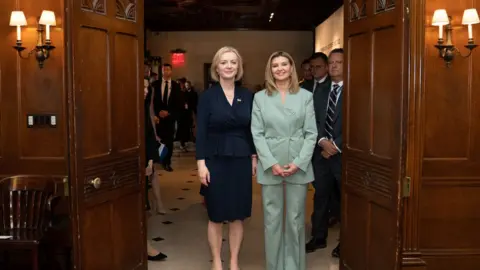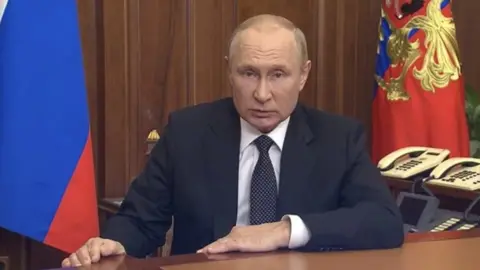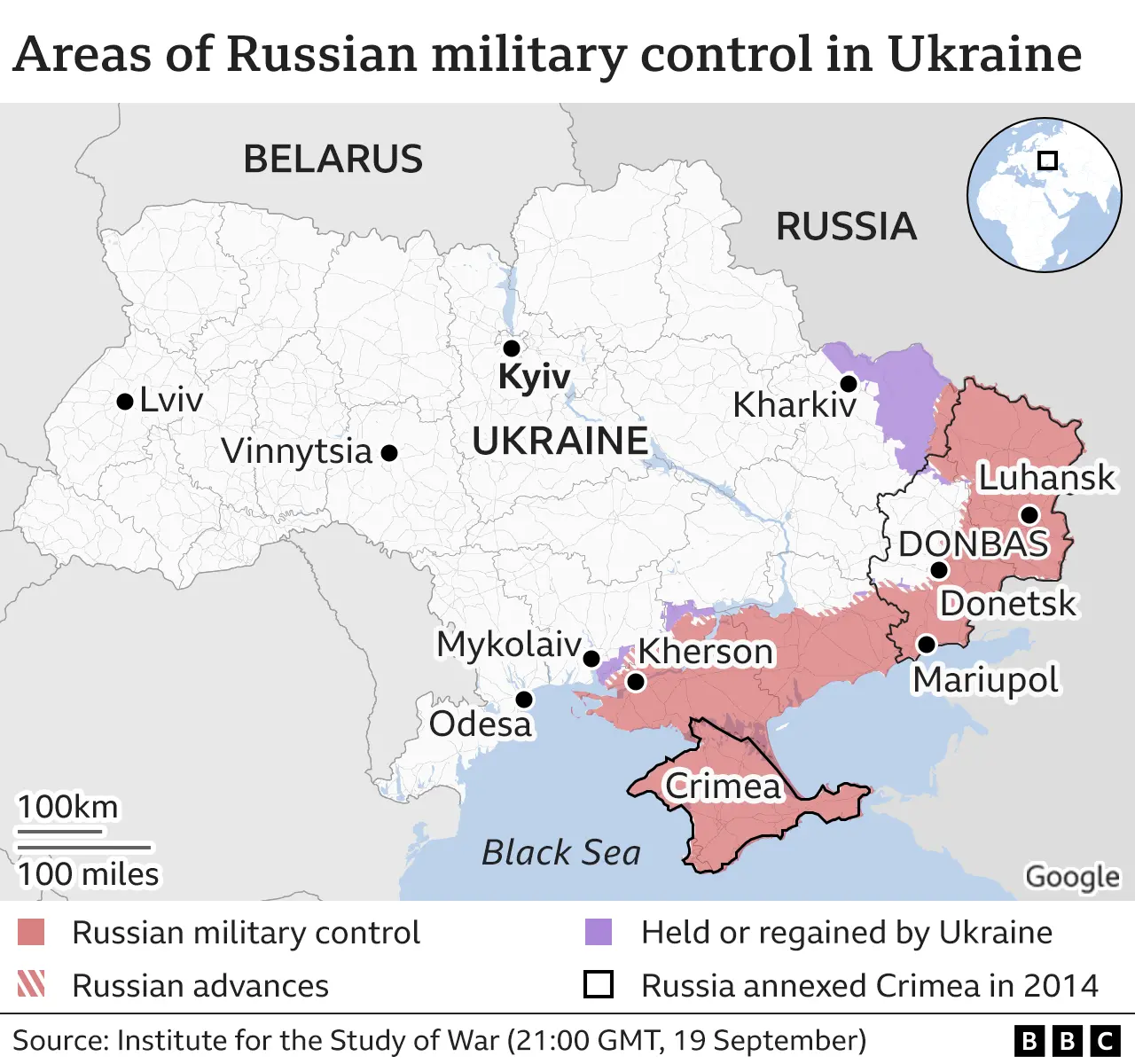Putin speech clear admission of Ukraine failure, says Downing Street
 PA Media
PA MediaDowning Street says President Vladimir Putin's call-up of Russia's military reservists is a "clear admission" his invasion of Ukraine is failing.
Mr Putin called the mobilisation a necessary step to protect Russia's territorial integrity.
No 10 condemned Russia's "reprehensible actions" and said the UK would continue to support Ukraine.
Prime Minister Liz Truss vowed to stand up for freedom in a speech to the UN General Assembly in New York.
On her first foreign trip as prime minister, Ms Truss argued that democratic nations should prioritise economic growth and security in a new era of strategic competition.
She also used her speech on Thursday to rally support for Ukraine and highlight the threat from authoritarian states such as Russia and China.
Ms Truss said: "The Ukrainians aren't just defending their own country, they're defending our values and the security of the whole world. That's why we must act."
The prime minister also pledged to "sustain or increase" the military support to Ukraine "for as long as it takes", telling the assembled UN delegates that "we will not rest until Ukraine prevails".
"The time to act is now. This is a decisive moment in our history, in the history of this organisation and the history of freedom."
Earlier this week, the government said it would match or exceed the £2.3bn support given to Ukraine's "inspirational" troops since Mr Putin's forces invaded the country in February.
On Wednesday, a No 10 spokeswoman said: "Putin's speech and his move to mobilise the Russian population are a clear admission that his invasion is failing.
"The UK alongside our international partners stand united in condemning the Russian government's reprehensible actions."
Downing Street said US President Joe Biden and Ms Truss both "condemned Putin's recent belligerent statements on Ukraine" when they held their first one-on-one meeting at the UN summit.
"They agreed his actions highlight the need for allies to continue their economic and military support to Ukraine," a read-out of the meeting said.
Ukraine support
Ukrainian First Lady Olena Zelenska and prime minister Denys Shmyal were among the foreign leaders Ms Truss has already met in New York.
Ms Truss's pledge to support Ukraine in the long term echoes a key policy plank of the previous UK government led by her predecessor, Boris Johnson.
In a previous speech, when Ms Truss was foreign secretary, the prime minister said Russian forces must be pushed out of "the whole of Ukraine".
On Tuesday, Ms Truss said "we are facing incredibly tough economic times" after Russia's invasion of Ukraine and the aftershocks of the Covid-19 pandemic "pushed up energy prices", but she said higher fuel bills were "a price worth paying" for the UK's long-term security.
In her UN speech, Ms Truss called on democracies "to harness the power of co-operation seen since Putin's invasion of Ukraine to constrain authoritarianism".
In a meeting ahead of her speech, Ms Truss and European Commission President Ursula Von der Leyen agreed that Mr Putin's mobilisation of reservists was a "statement of weakness".


As the motorcades of innumerable world leaders clog the streets of Manhattan, in the corridors of the United Nations the war in Ukraine shapes every conversation.
This international crisis has profound and obvious domestic implications that have forced the government to act to help businesses as well as households.
Ms Truss's address to the UN here and what amounts to a Budget in all but formal title on Friday offers the clearest picture yet of her new government's worldview and strategy - and it is shaped by the war.
The prime minister said the "free world", as she put it, must prioritise economic growth so it is "no longer strategically dependent on those who seek to weaponise the global economy".
Hence, a desire to boost defence spending, and a commitment to turbocharge the economy, with tax cuts the preferred fuel.

Mr Putin accused the West of wanting to destroy Russia and stressed he would use "all available means" to protect its territory.
"Those who are trying to blackmail us with nuclear weapons should know that the wind can also turn in their direction," President Putin added.
In an interview with Germany's Bild media group, Ukrainian President Volodymyr Zelensky said he did not think Mr Putin would resort to nuclear weapons.
German Chancellor Olaf Scholz denounced the call-up as "an act of desperation" in a "criminal war" he said Russia could not win.
The chief of the Nato alliance, Jens Stoltenberg, lambasted Mr Putin's "dangerous and reckless" rhetoric but said his words were not new or surprising.
"He knows very well that a nuclear war should never be fought and cannot be won, and it will have unprecedented consequences for Russia," Mr Stoltenberg said.
 Reuters
ReutersBut a former adviser to President Putin, political scientist Sergei Markov, accused Western leaders such as Ms Truss of being aggressors, not Russia.
When asked if President Putin could use nuclear weapons against Western nations such as the UK, Mr Markov told the BBC the situation could arise if the "Prime Minister of Great Britain Liz Truss still has plans to destroy Russia".
Mr Putin's escalation followed a sweeping counter-offensive by Ukraine in the country's north-east in the past weeks, with its forces retaking hundreds of towns and villages that had been controlled by Russia for months.
A British defence intelligence update suggested Mr Putin was being forced to undermine his own public position that the war in Ukraine was a "special military operation" rather than a full-scale conflict.
"These new measures have highly likely been brought forwards due to public criticism and mark a further development in Russia's strategy," the Ministry of Defence said.
Meanwhile, Western nations have condemned Moscow's plans to hold so-called referendums in parts of Ukraine that are currently under Russian control.


